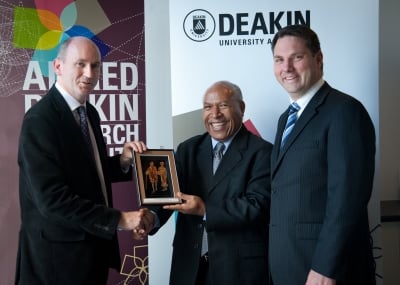Papua where?
Research news
What do you know about Papua New Guinea? The Kokoda Track? That bit at the top of Australia? An unsafe place to visit?
Experts from Australia and Papua New Guinea are hoping to help broaden our understanding of PNG at a symposium being organised by Deakin University’s Alfred Deakin Research Institute and Parliamentary Secretary for Pacific Island Affairs Richard Marles MP on Friday May 27.
The Director of ADRI, Professor David Lowe, said that after World War II Australians had had a high level of engagement and understanding of PNG, partly based on Australia’s involvement in helping the country move toward nationhood. But since then interest in the country had waned, politically, socially and academically.
“We feel that Australians’ knowledge of PNG has really slipped,” he said.
“We need to rediscover our closest neighbour and develop a much deeper understanding of what, in 20 years time, will be an even more important relationship to us.”
Professor Lowe said PNG’s new generation of political leaders would confront many important challenges.
“PNG is blessed with an extraordinarily rich natural-resource endowment, including vast reserves of natural gas and other minerals, which could help it prosper in the future.
“But managing the growth in revenue from its mineral resources and distributing it across the rapidly growing population will be a major challenge for the PNG government.”
Professor Lowe said the country faced other challenges, too. The country was still grappling with the social and environmental impacts of mining activities along the OK Tedi and Fly Rivers, and had to develop ways to respond to growing interest from international investors, including China.
“The country’s geography, while stunningly beautiful and environmentally significant, also poses other challenges. At the most basic level, it’s extremely difficult to get from A to B. Road links are undeveloped and transporting goods and people in PNG can be complicated,” he said.
“Bougainville, having endured a long conflict, is due to vote on its future status some time between 2015 and 2020. This will be of great significance to Australia, and to the region,“ he added.
Presenters from business, government, academia and the wider community will offer perspectives on a range of topics, including the minerals sector, the larger economy, development, the law and women in society.
Each of these topics presents an opportunity to challenge old assumptions about our nearest neighbour, its status in the region and its future.
By bringing together academics from across Australia and from PNG, the symposium also aims to generate in Australia renewed interest in PNG studies, and to strengthen academic collaborations within the South Pacific region, in fields as diverse as the natural sciences, language, history, the arts and conflict resolution.
“These are crucial times for PNG, for Melanesia and the wider South Pacific and I am pleased ADRI is able to play a key role bringing together experts from PNG and Australia,” Professor Lowe said.
“I hope the symposium will drive a greater understanding of its people, the challenges they face and its future.”
Conference speakers will include:
- Professor Andrew Macintyre , Australia National University
- Professor Thomas Webster, PNG National Research Institute
- Mr Anthony Regan, State, Australia National University - Bougainville 1988-2020: ‘Intractable’ Conflict, Inspirational Peace-building, and Intriguing Prospects
- Associate Professor Asafu-Adjaye, University of Queensland
- Dr Stephen Howes, Australia National University – Maximizing the benefits to PNG from domestic and external resources
- Professor Satish Chand, Australian Defence Force Academy, The Nexus between Peace and Prosperity: Evidence from Post-conflict Bougainville
- Dr Simon Feeny, RMIT, Foreign Aid Effectiveness in Papua New Guinea
- Professor Mark McGillivray, Alfred Deakin Research Institute
- Mr Ian Clarke, President, Australia-PNG Business Council
- Dr Nicole Haley ANU
- Ms Tricia Caswell , Founder & CEO, Tricia Caswell and Associates
- Professor Ross Hynes, Vice-Chancellor, University of PNG
- Dr Jonathan Ritchie, Alfred Deakin Research Institute
- Mr Wep Kanawi, National AIDS Secretariat, Health in PNG
- Dr Ceridwen Spark, Victoria University, Educated Women in PNG: Who are they today
- Mr Ian Kemish , Australian High Commissioner to PNG
- Mr Eric Kwa, PNG environmental lawyer, Reducing Environmental Conflicts: Community Participation in Environmental Decision-making in PNG
- Dr Genevieve Nelson, Kokoda Track Foundation, Pawa Givim Meri: Empowering Kokoda women through microbusiness
- The Hon. Powes Parkop MP Governor, National capital District; Member of PNG National Parliament; founder of Social Democratic Party (cross-benches)
- Mr Rowan Callick, The Australian, The Law in the Dock
- Professor Ted Wolfers University of Wollongong
Share this story
 Professor David Lowe (left), Dr Thomas Webster and Richard Marles
Professor David Lowe (left), Dr Thomas Webster and Richard Marles
